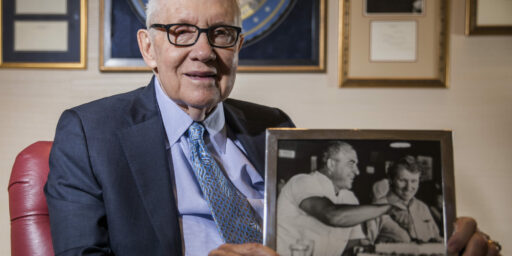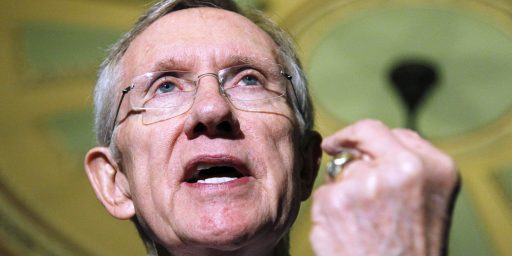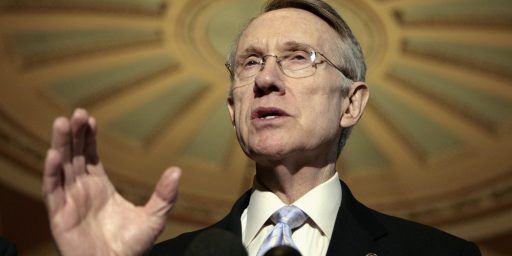Bush Doubles Down on Iraq
Defying the polls and conventional wisdom, President Bush bet his last remaining political capital on success in Iraq, not only defying calls for a rapid pull-out but saying that American troops would likely remain in Iraq well beyond his presidency.
AP White House correspondent Terence Hunt reports that, “The White House believes that people appreciate Bush’s plainspoken approach even if they disagree with his decisions.” His colleague Tom Raum is skeptical.
President Bush says he’s spending his remaining “political capital” on the war in Iraq. The trouble is, he may have little left.
With his approval ratings at a low point and no end in sight in the war, Bush is trying to replenish his assets with a direct appeal to the nation that emphasizes the positive but also concedes grim realities. It’s a midcourse correction for the White House — one that is taking Bush away from speaking about Iraq primarily on military bases and before other supportive audiences. Lately, he’s been speaking more candidly about the war — and taking more impromptu questions. He’s making an aggressive case.
“He’s going into the lion’s den. And I think it’s a tough thing for him to do,” said Ross Baker, a political scientist at Rutgers University. “But it’s something he has to do. One criticism has been his isolation, not just physical isolation but intellectual isolation. He’s now gotten to the point where he’s conceding that there are great difficulties. He’s not simply cheerleading.”
WaPo’s Jim VandeHei thinks this is just par for the course, asserting that, “Since the invasion, Bush has emphasized different rationales for the Iraq invasion, such as the need to topple a dangerous dictator and to eliminate weapons of mass destruction, which have yet to be found.”
NYT’s Elisabeth Bumiller notes that, “The speech tactic worked in late 2005 when another series of Iraq addresses helped to stabilize the president’s poll numbers temporarily. But analysts said that with his message now familiar to the nation, it was not clear whether people were listening.” Anthony Cordesman conjectures that, “The problem with the speeches is they get gradually more realistic, but they are still exercises in spin. They don’t outline the risks. They don’t create a climate where people trust what’s being said.”
We are certainly past the point where presidential pep talks are going to be enough to turn around public perceptions. Bush is caught in a vicious cycle where daily televised images of violence out of Iraq overwhelms the less telegenic good news, driving down public confidence in not only our chances of success in Iraq but in Bush as well.
Pejman Yousefzadeh disagrees. He contends “he country at large is willing to listen to such a defense and be persuaded by it if it is given with passion, with reason, loudly and often” but the White House has demonstrated the “inability and/or unwillingness to take the issue of defending its Iraq policy and make it into a full time job.” Ed Morrissey agrees, suggesting, “George Bush needs to hold conferences like this more often; he always manages to outperform expectations when he does, and the American people like his direct manner when interacting spontaneously with the press and with audiences for his speeches.”
Betsy Newmark offers a twist: “The President should hold more press conferences. And he should call on Helen Thomas every single time. The sight of her sparring with him and interrupting him before he could get a couple of words out of his mouth did more to remind people of what they like about Bush than any of those speeches that he gives around the country that few people hear about because the media will only show a couple of seconds.”
Kevin Drum, who terms Harry Reid “a pretty astute leader of Senate Dems,” suggests that his repetition of the mantra “open-ended commitment” well be an effective rallying cry, although he would like to see Reid (or somebody) propose a feasible withdrawal plan.






No question a pound of W’s flesh has been extracted. By MSM, the left …. and all and sundry other proud fifth columnists. They currently have it resting on their dining room tables, and breakfast nooks. They look at it, marvel at it, and smile. Hold it aloft and wonder at their powers of nothingness. They revel in their worship of the high priests of nihilism.
This is modern politics. Policy or progress be damned. Full speed ahead, deep into the partisan breach. Whose bottom has yet to be seen, known, or explored.
Bush has come across as a guy who is both confident and comfortable with the decision he made. So much so that he can talk about the errors that were made over the last three years. IE about how the first offensive in Tal Afar became a valuable lesson learned; the need for follow on indigenous forces to provide security.
I think he sees the trend lines going in his direction.
The media, the talking heads and the political class is not looking at the same set of facts as the President. The media and Democrats in particular have bought into their own critique:Bush is an idiot and the public is losing trust. After all, “the polls” prove it. Don’t they?
I haven’t seen the word “credibility” used so often in “news” articles since 1969. Or was it 1974?
It’s not all beer and skittles for Bush. He’s been on a bad losing streak for 9 months. That’s taken a toll on his political health. But losing streaks end. And when you have the powers of the Presidency at your disposal, that’s a helluva combat multiplier.
And I’m not much for the Dick Morris strategy of being on TV all the time touting your achievements. I think that works fine if you are Bill Clinton. I doubt if it would work well for anyone else. Clinton was persuasive in that role because he was “sincere”. He believed in the need to brag about his policies and their success. The media was more than happy to midwife his popularity and “success”. But we often forget that before the 1996 election, he was reduced to moaning abouth how he was still relevant.
Bush can come back from the doldrums. I hope that this marks the end of his downturn. Not ready to bet the ranch yet, but I’m beginning to see the light at the end of the tunnel.
Clinton could feed his base with a neck-deep line of B.S., with a tear in his eye, and they would, and still do (for some reason) gobble it up.
Bush tells it like it is. It’s ‘uncomfortable’ for some people, and that pisses them off. Interesting that some one who is such a liar can simultaneous say so many ‘distasteful’ things. Why would he just stay in character, and ‘lie’?
I thought his comment yesterday was awesome, about Democrats standing up against the terrorist monitoring program. They won’t do it, nor will they take a firm stance on Iraq, because it would be political suicide. Good on him.
Some people want a President that tells them what they want to hear, true or not. Bush tells people what needs to be done, and they pick out the parts that they want to hear, to support their beliefs. That’s the difference, just look at any dialogue on impeachment. All hysterics, no substance.
George Burns said, “The secret to acting is sincerity. If you can fake that, you’ve got it made.”
Policy by poll numbers is suicide.